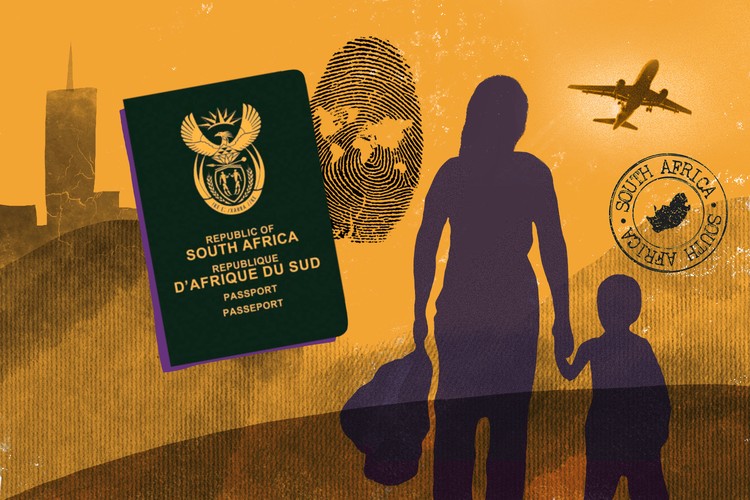We need to change the law on gender recognition
Ordinary administrative tasks are fraught with risk for trans people
Everyday administrative tasks are fraught with risk for trans and gender-diverse people, says the writer. Graphic: Lisa Nelson
Opening a bank account, applying for a social grant or a phone contract, reporting a car accident, getting an affidavit at the local police station or boarding a plane: these are ordinary tasks for most people. Tedious, perhaps, but rarely dangerous.
But for trans and gender-diverse people in South Africa without an identity document that reflects how they live in the world, these everyday actions are fraught with risk.
Trans and gender-diverse people have shared with me experiences of being denied services, detained or accused of fraud, and treated as though they are attempting to evade the law, simply for presenting an identity document which does not align with how they are perceived or present themselves.
In Gender Dynamix’s 2024 report, a transgender woman described how she was denied the right to open a domestic violence case at a local police station. After she presented her ID, the officials mocked her and told her to “go home and fight back like a man”.
Such incidents reflect more than individual prejudice - they reveal a systemic failure in our legal and administrative frameworks, which not only denies trans people dignity but also obstructs their access to justice and protection.
Trans and gender-diverse persons have told how they have been asked to “prove” their gender identity in degrading and invasive ways. These are not isolated incidents - they are systemic consequences of a legal framework that demands trans people conform to medical and binary standards before they can be recognised as who they are.
Legal Gender Recognition refers to the process of changing a person’s legal documents to reflect their gender identity. This can include changing a person’s first name or gender marker on their birth certificate, ID, driver’s licence, passport, and other official documents. In South Africa, this has been enacted in the Alteration of Sex Description and Sex Status Act of 2003.
But the Act requires that someone who wants to change their gender marker, must be actively engaged in what the Act calls “medical treatment” (which usually takes the form of hormonal therapy). They must obtain two letters saying so from a doctor, nurse, psychologist, or social worker. This means that people who don’t want to be on medical treatment are locked out of accessing legal gender recognition.
Moreover, the Act adopts the binary sex classification system used by the National Population Register – effectively excluding non-binary and other people on the diverse gender spectrum. For the law, everyone is either male or female and must choose one of the two.
There are also financial costs involved in changing one’s gender marker and first name — about R500 on average — which are an obstacle for some.
As for asylum seekers and refugees who have fled here because of issues with gender identity and recognition, the door to legal gender recognition is closed to them. Though there is nothing in the Alteration of Sex Description and Sex Status Act of 2003 which stipulates that it only applies to South African citizens and permanent residents, its focus on amending information captured in the Birth Register Act and the Identification Act means it cannot be applied to refugees and asylum seekers.
In addition, as Gender Dynamix and the Legal Resources Centre have pointed out, the Act uses outdated and prejudiced language like “sex change” and “gender reassignment”.
New legislation needs to be enacted, which replaces this Act and has the following features:
- Trans and gender diverse persons wanting to change their gender marker should not have to have “medical interventions”.
- A category should be created which captures those who identify outside cisgender binary. An easy solution would be to include a “Category X” which non-binary, agender and others who are not comfortable with “F” or “M” can opt for.
- Fees should be waived for the first time people engage in name and gender marker changes.
- The system should be opened to refugee and asylum seekers and those incarcerated, so that these already vulnerable and marginalised groups can have their gender identity affirmed.
- Government officials who deal with members of the public who are applying for gender marker changes need to undergo sensitisation training so as not to cause harm to the people they are employed to serve.
Trans and gender-diverse people should not be forced to prove their existence. They exist, and the legal gender recognition system should acknowledge that.
Views expressed are not necessarily those of GroundUp.
Support independent journalism
Donate using Payfast

Don't miss out on the latest news
We respect your privacy, and promise we won't spam you.
Next: People with HIV go hungry as Gauteng government cuts funds
Previous: Lottery licence evaluators had no lottery experience
© 2025 GroundUp. This article is licensed under a Creative Commons Attribution-NoDerivatives 4.0 International License.
You may republish this article, so long as you credit the authors and GroundUp, and do not change the text. Please include a link back to the original article.
We put an invisible pixel in the article so that we can count traffic to republishers. All analytics tools are solely on our servers. We do not give our logs to any third party. Logs are deleted after two weeks. We do not use any IP address identifying information except to count regional traffic. We are solely interested in counting hits, not tracking users. If you republish, please do not delete the invisible pixel.

